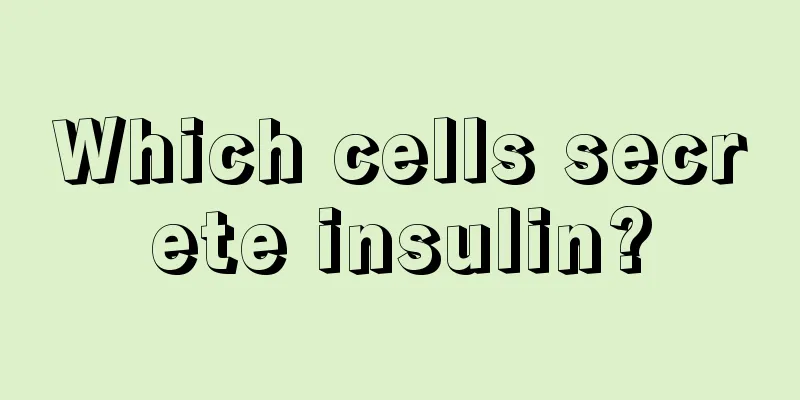Which cells secrete insulin?

|
Many people have seen people taking insulin, which is mainly used to control blood sugar balance, which is a way to treat diabetes. Which cells secrete insulin in a normal and healthy person? , which is secreted from the pancreatic beta cells in the pancreas. It is a protein hormone. The lack of this hormone will pose a greater threat to the body and cause diabetes. 1. What cells secrete insulin? Insulin is a protein hormone secreted by the beta cells of the pancreas. Insulin is involved in regulating sugar metabolism, controlling blood sugar balance, and can be used to treat diabetes. Its molecular weight is 5808 Daltons. Insulin has a molecular weight of 5700 and is composed of two amino acid peptide chains. The A chain has 21 amino acids and the B chain has 30 amino acids. There are two disulfide bonds between the AB chains. The pancreatic B cells store about 200U of insulin, and secrete about 40U per day. When fasting, plasma insulin concentration is 5-15 μU/mL. Plasma insulin levels can increase 5 to 10 times after a meal. The biosynthesis rate of insulin is affected by the plasma glucose concentration. When the blood glucose concentration increases, the proinsulin content in B cells increases and insulin synthesis accelerates. 2. What is the role of insulin in glucose metabolism? Many people know that insulin can lower blood sugar, but that is just a surface phenomenon. In fact, insulin has five major effects on the regulation of glucose metabolism: promoting the entry of glucose into cells; promoting glucose phosphorylation; promoting glucose oxidative decomposition; promoting glucose synthesis into glycogen; and resisting glucose anisolysis. Glucose can only be used after entering cells. It is now believed that only liver cell membranes can allow glucose to pass freely, while all other cells, especially muscles and fat that account for more than 65% of the human body, must rely on sugar transporters on the cell membrane to enter the cells. Insulin can increase the number and transport speed of sugar transporters. 3. What is the effect of insulin on lipid metabolism? Insulin has two major effects on fat metabolism: one is to promote the synthesis of fat, and the other is to inhibit the release of fatty acids from adipose tissue. In fat cells, insulin can promote the further oxidation and decomposition of activated glucose, providing raw materials for the synthesis of fatty acids. Insulin can also inhibit the activity of lipase, slowing down the decomposition of fat; and promoting adipose tissue to absorb glucose and fatty acids from the blood. Ketone bodies are the product of fatty acid metabolism. Only a small amount of ketone bodies in normal blood are quickly utilized in the liver. If insulin is insufficient and sugar metabolism is impaired, it will lead to increased fatty acid decomposition. A large amount of ketone bodies exceeds the processing capacity of the liver and accumulate in the blood, causing ketonemia, which can seriously lead to acidosis. Factors that affect insulin secretion in the body 1. Plasma glucose concentration Plasma glucose concentration: is the most important factor affecting insulin secretion. After oral or intravenous administration of glucose, insulin release is a biphasic response. In the early rapid phase, insulin in portal vein plasma reaches its highest value within 2 minutes and then drops rapidly; in the delayed slow phase, plasma insulin level gradually rises again after 10 minutes and lasts for more than 1 hour. The early rapid phase shows the release of stored insulin triggered by glucose, and the delayed slow phase shows the synthesis of insulin and the conversion of proinsulin to insulin. 2. Eat foods rich in protein: After eating foods rich in protein, the concentration of amino acids in the blood increases and insulin secretion also increases. Arginine, lysine, leucine and phenylalanine all have a strong effect in stimulating insulin secretion. 3. Increase gastrointestinal hormones after meals: Increase can promote insulin secretion, such as gastrin, secretin, gastric inhibitory peptide, vasoactive intestinal peptide can stimulate insulin secretion. 4. Autonomic nervous function state: Vagus nerve excitement promotes insulin secretion; sympathetic nerve excitement inhibits insulin secretion. Types of insulin 1. Ultra-short-acting insulin: takes effect in 10 to 20 minutes, reaches peak effect in 1 to 2 hours, and lasts for 3 to 5 hours. This category includes insulin analogs such as lispro insulin and aspart insulin, which have a rapid onset of action and a short duration of action. When used clinically, care must be taken to eat within 10 minutes after drug injection to avoid hypoglycemia. 2. Short-acting insulin: It starts to take effect in 0.5 to 1 hour, reaches its peak effect in 2 to 4 hours, and lasts for 5 to 7 hours. This type of insulin includes regular insulin and biosynthetic human insulin injection. Therefore, this type of insulin can be used for intravenous injection, especially regular insulin injection, which is widely used for clinical intravenous injection. When using the medicine, it is necessary to avoid mixing it with other drugs to avoid incompatibility. 3. Intermediate-acting insulin: takes effect in 1 to 1.5 hours, reaches peak effect in 8 to 12 hours, and lasts for about 24 hours. Commonly used insulins in clinical practice include low-protamine Hg insulin (NPH) and recombinant human insulin (N). This type of insulin should be injected subcutaneously 30 to 60 minutes before breakfast. If the daily dosage exceeds 40u, it should be injected in two times, 2/3 of the daily dose before breakfast and 1/3 of the daily dose before dinner. |
<<: What to do if your palm is burned by hot peppers
>>: Avoid when practicing Tai Chi
Recommend
What are the ointments for removing warts
Warts are skin growths caused by the human papill...
Treatment methods for pseudophimosis
The vast majority of male friends have phimosis, ...
Can aloe vera remove freckles?
In daily life, no one wants to have freckles on h...
I feel a tightness in my chest after eating
Food is the most important thing for people. We a...
Is the mortality rate of immune encephalitis high?
Immune encephalitis is a disease of the human imm...
Are there any side effects of retaining needles?
Since long-term infusion is required, retention n...
How does TCM understand prostate cancer?
There is no such disease name as prostate cancer ...
Is fibroid a genetic disease?
Is fibroid a genetic disease? Many young fibroid ...
What are the methods of gastric cancer review?
For gastric cancer reexamination, you can go to t...
How to clear blocked ears due to cold
Many people will have more blood congestion in th...
What are the benefits of eating grapefruit? Promote appetite, regulate qi and relieve stagnation
Pomelo is fragrant, sweet and sour, cool and refr...
Face tightening exercise
As we age, our skin begins to sag. Especially whe...
How to relieve neck pain
The neck is the part that connects the head to th...
Analyzing the cost issue of glioma treatment
The cost of treating glioma is the first thing th...
What are the complications of laryngeal cancer surgery
Surgery is the main and effective means of treati...









